I love Agatha Christie. She is easily one of the greatest novelists of all time. And I love Hercule Poirot too. He’s easily one of the greatest detectives of all time. Arguably even greater than Noddy, Toyland Detective.
But even Dame Agatha dropped the ball occasionally. Out of her 33 Poirot novels, I would say 4 merit inclusion in the categories of “bad” or “awful”. Here’s my ranking of them (from least bad to most bad).
One, Two, Buckle My Shoe (1940)
With this book, Agatha Christie decided to explore one of Britain’s favourite conversation topics — dentists. (For younger readers, dentists are people that used to have appointments available so they could check your teeth). In this case, Poirot’s dentist is found dead, and then some other people die. Unsurprisingly, Hercule Poirot solves the mystery, with Inspector Japp making his final appearance. Japp’s departure is no great loss: I feel Japp was a more valuable character in the ITV Suchet adaptations than in the novels.
The plot unfolds against the backdrop of political tensions, reflecting the wartime publication. Some of its early readers undoubtedly loved this as providing topical colour. Other readers probably hated it because it undermines the escapist potential of the novel. And then there’s the reviewer in the Times Literary Supplement, who said: “Its mystery will not be easily solved. But it is as cold and cheerless as a diagram.”1 (No offence to people who really like diagrams).
Her agent Edmund Cork was not overly enthused with the story either, and Agatha Christie agreed, saying: “not one of my best”.2 There are some interesting aspects to the plot, and some good humour — including when the dentist makes the mistake of accusing Poirot of being French. But the mystery overall is convoluted, forgettable, and disappointing.
Verdict: ⭐⭐ (2/5)
Elephants Can Remember (1972)
Opening with a multi-page discussion of hats, this novel sees Poirot investigate a possible historic crime, involving a double suicide/murder. He is accompanied (for the sixth and final time) by the wonderful Ariadne Oliver, whose goddaughter Celia is daughter of the deceased. If I recall correctly, the theme of memory is (as the title suggests) important as the book unfolds.
In some ways, it’s sad to include this title in my ranking. Christie was in her 80s at the time, and her mental agility was clearly diminished. A 2009 University of Toronto study even argued (albeit with an unknown level of reliability) that the novel’s prose shows evidence of Christie suffering from Alzheimer’s.3 In any case, the book feels limp and tired. The investigation is muddled, and the solution is a bit obvious. Poirot’s little grey cells seem much littler than before. Even Ariadne Oliver lacks her usual energy.
A review in The Observer commented: “Any young elephant would be proud to have written it.”4 But given that elephants of any age are very limited in both their writing abilities and their grasp of the English language, this is not a huge compliment. Although it is still better than anything I’m likely to write in my 80s, so…
Verdict: ⭐⭐ (2/5)
The Mystery of the Blue Train (1928)
The circumstances around The Mystery of the Blue Train and The Big Four (see below) are tragic, and it’s not at all surprising that Christie’s weakest Poirot output stems from this period. In 1926, she was deeply affected by both the death of her mother and the breakdown of her marriage. Despite her mental state, the success of The Murder of Roger Ackroyd meant she was essentially forced into writing. In her Autobiography, she describes this as the moment she “changed from an amateur to a professional”, assuming the burden of writing “even when you don’t want to”.5
The novel’s plot is expanded from the 1923 short story “The Mystery of the Plymouth Express”. It starts off like an international spy thriller, then becomes a series of random conversations, and then there’s a train, by which point I had lost interest. Thankfully, Christie was not willing to be defeated by train-related mysteries, and went on to write an excellent one in the 1930s.6
Christie’s own assessment of this novel was fairly clear: “Easily the worst book I ever wrote… I hate it.”7 Incredibly, press reviews were generally positive. The New York Herald Tribune described it as “a truly honourable thriller in the right classic tradition, warranted to restore the jaded reader’s faith in clews.”8 I strongly disagree, but I do love how they used to spell clews. Let’s bring that back.
Verdict: ⭐ (1/5)
The Big Four (1927)
If this was the first Christie novel I had picked up, I’m not sure if I would have bothered with any others. Faced with the pressure of writing when she didn’t want to, her brother-in-law Campbell Christie assisted her in revising a series of short stories published in 1924 under the title “The Man Who Was Number Four”. In theory, the aim was to produce a coherent novel. In practice, the hasty reworking is very obvious, leaving the book disjoined and repetitive.
There was also a problem with the short stories in the first place. Poirot does not fit comfortably into tales of international espionage. This is especially obvious when you have an implausibly exaggerated quartet of supervillains, as in The Big Four. I’m glad this case proved to be an aberration in Poirot’s career, and that Christie was later content to keep him fairly domesticated.
Amazingly, this book became very popular, selling more than twice the number of copies as Ackroyd. Press reviews were not uniformly positive, but The Daily Express loved it. “One of the liveliest and most entertaining mystery stories that has been written for some time.”9 One of several reasons why I’m cautious about trusting the Express’s journalism.
Verdict: ⭐ (1/5)
That concludes my countdown of the worst Poirot novels. Do you agree? What would you add to the list? Do you think one of these four is an underappreciated gem?
Quoted in Mark Aldridge, Poirot: The Greatest Detective in the World (HarperCollins, 2020), 158.
Aldridge, Poirot, 156.
Aldridge, Poirot, 288.
Aldridge, Poirot, 289.
Agatha Christie, An Autobiography (Fontana, 1978), 369.
Murder on the Orient Express, if that’s not obvious.
Aldridge, Poirot, 37.
Dennis Sanders and Len Lovallo, The Agatha Christie Companion (W. H. Allen, 1985), 47.
Aldridge, Poirot, 36.

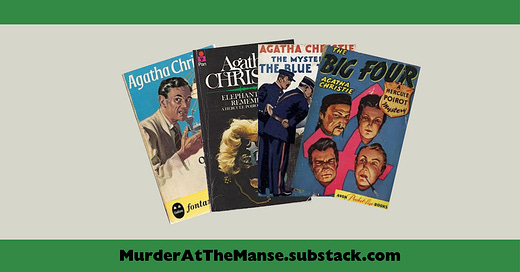



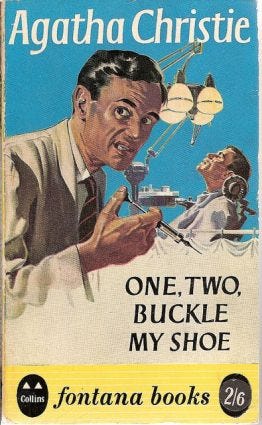
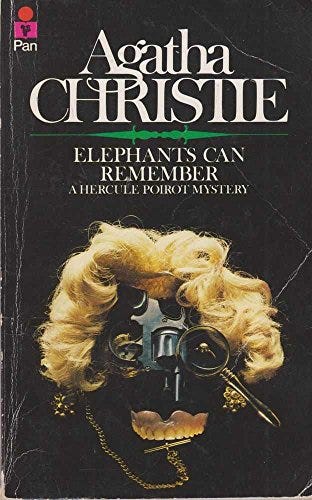
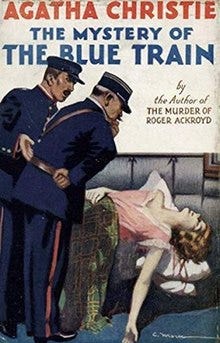
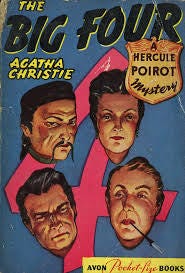
I'd place Blue Train at the bottom of this list personally - I find it a really awkward read. I put a pretty big gulf between Buckle and those other three as I don't have strong feelings about it the way I do with the others. I may feel differently after a reread tho!